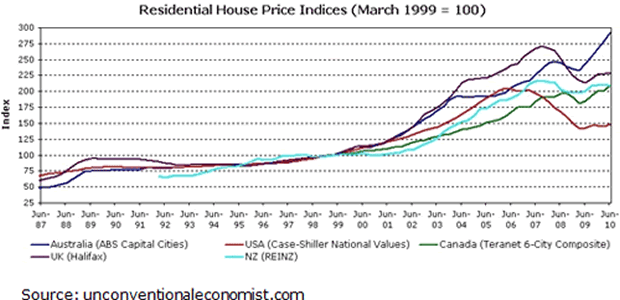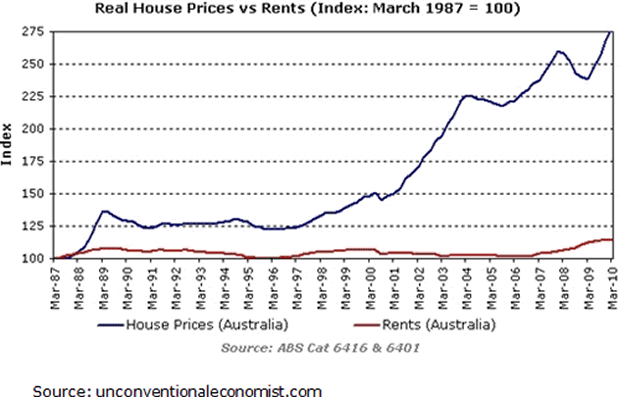Australia's Housing Bubble Illustrates All Governments Intervening to Delay Inevitable Bust
Housing-Market / Austrailia Nov 21, 2010 - 06:06 AM GMTBy: Bryan_Rich
 The past three years have been dominated by government intervention …
The past three years have been dominated by government intervention …
The U.S. propped up the banks with TARP money, and then gave banks ultra-easy money terms to recapitalize. And to unfreeze the global credit markets, the U.S. provided unlimited dollar swap lines with global central banks.
China rolled out the biggest fiscal stimulus package in the world as well as ultra-easy loan programs (relative to GDP). This gushed money into asset markets around the world. And despite mounting pressure to revalue its currency, China has continued to tamp down the yuan to keep exports flowing and its economic engine humming.
Europe stepped in as a buyer of last resort to keep souring European economies alive to see another day. And despite their efforts to stabilize the region, they’re now working up a plan to plug another leak in the dam … this time in Ireland.
Japan fired off fiscal stimulus one after another … and QE one after another. Plus, acting alone, it directly intervened to weaken the yen.
Meanwhile, Brazil, Korea, Singapore, Thailand, Malaysia, and Indonesia have all intervened in an attempt to weaken their currencies through outright currency market intervention and/or capital controls.
Yet all this government intervention has done nothing but postpone a day of reckoning for the global economy.
Still, the Fed is back at it with another round of QE!
The goal of all of this intervention has been simple: Numb the pain until the global economy can heal — i.e. find its way back to sustainable growth.
But it hasn’t worked.
And it hasn’t worked because the economic model the world has been operating on is flawed. It all boils down to lopsided trade — or imbalances. If you’ve followed the G-20 events of the past two years, you know that global leaders have vowed, as their number one goal, to repair global imbalances.
|
But those vows have proven to be nothing more than words. The fact is this fundamental problem is a giant to tackle. And it’s especially difficult given an environment where everyone wants to export their way to recovery.
So how should we expect this to play out?
Booms and Busts
The band-aid approach taken by the world only sets the stage for more booms and busts ahead. And given the magnitude of intervention, the booms could be even more dangerous than the original excesses that set off this economic crisis.
For an economy that’s setting up for this cycle to play out, let’s take a look at Australia …
Australia is charging ahead with marveled growth. And while the advanced economies of the world are still trying to create easier money conditions, the Reserve Bank of Australia has been tightening — ratcheting up interest rates aggressively for the better part of the past year.
The key fuel for its economic performance: The worldwide intervention phenomena listed above.
|
The fact is Australia rode the same wave of credit as the rest of the world. But when big economies sank and started cranking up the printing presses, that money spilled over into Australia, making its wave just bigger and bigger.
Consider this: In Australia home prices have doubled in value in eight years and quadrupled in 21. The average buyer in Sydney now pays at least 7.5 times annual income for the average home. For a perspective, that means an average Aussie household with a AUD$50,000 income is paying AUD$375,000.
Sound familiar?
And at current mortgage rates of 7.5 percent, the average buyer uses 56 percent of total income. That’s twice the 28 percent maximum personal finance experts recommend.
Take a look at these charts from an Australian economist.
The two lines to pay particular attention to are the royal blue line that’s bursting through the top corner of the chart (Australia) and the red line moving sideways (the U.S.). You can see that while America’s massive housing bubble peaked in 2006, the Australian housing market was still on the rise and just kept on climbing.
|
This data shows that, relative to the U.S. housing bubble, Aussie housing is in an much bigger bubble — over 50 percent bigger.
In fact, The Economist magazine says Australia’s property market is overvalued by a whopping 63 percent!
Need more proof? Look at the wild disparity between the price of a owning a home versus renting in the chart below.
|
As you can see, the ratio of price to rent has been surging over the past decade. And in the past year, it’s exploded higher!
This is a clear example of a bubble made even more dangerous by the interventionist policies pervading the world.
What’s more, it’s a good warning for those who have been chasing hot returns around the globe. Those returns come with substantial risk — especially currency risk.
The point here: We’re in a market of extremes. It’s quite possible that the deleveraging phase being felt in the advanced economies of the world has yet to reach other parts of the world. When it does, watch out.
And that’s why I’m working on a new service to help readers protect and profit from the growing currency crisis and rapid changes taking place to the value of money. Keep an eye out for the details coming soon.
Regards,
Bryan
P.S. This week on Money and Markets TV, we looked ahead to the holiday shopping season. Our panel of experts explained why it’s so important for the retail industry, as well as the overall economy, and how you can profit with ETFs.
If you missed Thursday night’s episode of Money and Markets TV — or would like to see it again at your convenience — it’s now available at www.weissmoneynetwork.com.
This investment news is brought to you by Money and Markets. Money and Markets is a free daily investment newsletter from Martin D. Weiss and Weiss Research analysts offering the latest investing news and financial insights for the stock market, including tips and advice on investing in gold, energy and oil. Dr. Weiss is a leader in the fields of investing, interest rates, financial safety and economic forecasting. To view archives or subscribe, visit http://www.moneyandmarkets.com.
© 2005-2022 http://www.MarketOracle.co.uk - The Market Oracle is a FREE Daily Financial Markets Analysis & Forecasting online publication.







